5th Wheel Towing Capacity Chart – Ultimate Towing Guide
5th Wheel Towing Capacity Chart – Ultimate Towing Guide
Do you need to tow a 5th wheel? If so, how much can your vehicle carry? This is an important question to ask before you make a purchase, and understanding 5th wheel towing capacity is critical.
A 5th wheel trailer can be quite heavy, and if your car or truck isn’t able to handle the weight, it could cause some serious damage. In this blog post, we provide 5th Wheel Towing Capacity charts that will help you determine how much certain vehicles can safely tow.
We also discuss and compare the different types of trucks and their pros and cons, and we also look into whether gas or diesel trucks are best for towing 5th wheels.
Further on we get into the different types of 5th wheel hitches. Each of these have a different 5th wheel towing capacity, so understanding which one is best suited for different vehicle sizes is important before you buy.
Of course truck size plays a major role in fifth wheel towing capacity, and we discuss this in great detail towards the end of the article. All sections are presented with a colorful 5th wheel towing capacity chart to make it easier to understand.
Short-Bed vs. Long-Bed for Towing – Pros and Cons
The first thing you need to know is whether your vehicle has a short bed or a long bed, as it will make a big difference in the amount of weight your vehicle can tow. A short-bed truck can typically tow between 5,000 and 12,000 pounds. A long-bed truck can usually tow between 12,000 and 20,000 pounds.
If you’re not sure which type of bed your truck has, you can check the owner’s manual or look online for the specifications. They both have their own upsides and downsides, but to shine a little more light on the topic of towing beds, here’s a small comparison of the two.
Short-bed Towing
Short-bed towing trucks are perhaps the most popular kind. They usually have a length of five feet, which is less than your average-sized bed. This makes them compact and makes parking a much easier task. Despite all this, they’re quite strong and versatile, and their 5th wheel towing capacity is more than you might imagine.
Pros
- These Trucks Are Easier To Maneuver, and Parking Them is Also Easier When They’re Not Attached To a Trailer
- They’re Easier to Drive On a Daily Basis as Well and Are Usually Used For Daily Driving
- They’re Often Built With a Spacious Cab
Cons
- The Size Of the Bed Makes the Towing Process a Little Less Convenient
- There’s Also Reduced Tuning Clearance For Vehicles That Are 5 Feet or Under That Mark
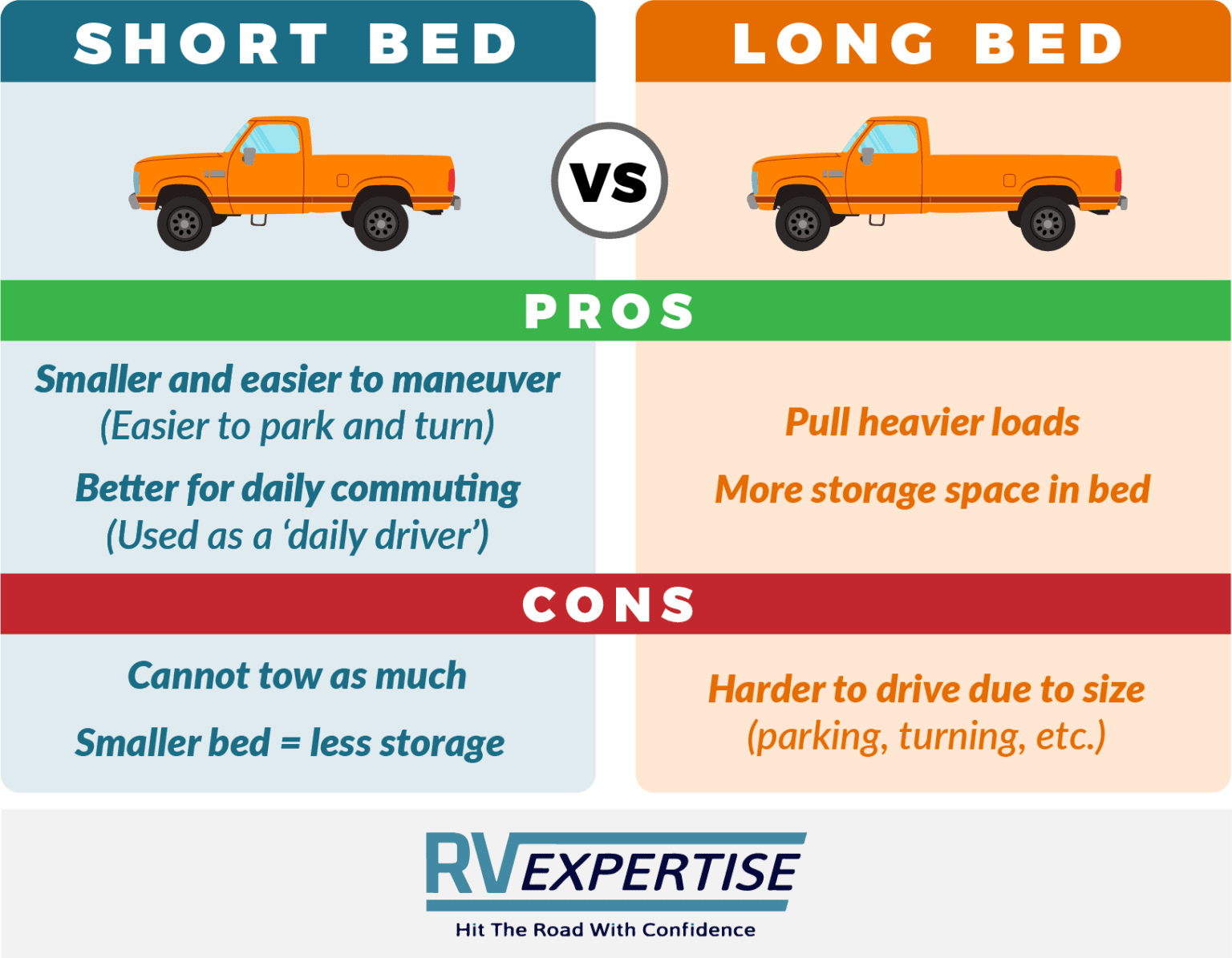
Long-bed Towing
Where short-bed trucks are more popular for everyday life, long bed towing is much preferred by those who partake in commercial work or those that need to move bulk materials. A long bed usually measures 7-8 feet in total. Naturally, a long bed can pull heavier loads, and they also have more clearance for turning than the short-bed.
Pros
- A Long Bed Can Pull Heavier Loads and Carry More Than a Short Bed
- It Also Has More Turning Clearance, So it Has Plenty of Room To Make Sharp Turns
Cons
- Dealing With a Large Bed On a Daily Basis Can Be a Bit Tricky
Should I Opt For Gas or Diesel When it Comes to Towing?
This is yet another important question that needs to be asked. Should you go for gas or diesel?
When we look at this question in terms of power, the apparent answer for it is diesel. There’s no doubt that diesel engines are quite powerful and are capable of producing more torque. However, it’s also important to ask yourself whether you need that torque.
Torque can be viewed as the strength of the truck. So, consider what you will be using your truck for. Nowadays, even gas engines have become quite powerful and capable of pulling great loads. So if you don’t have a difficult terrain to drive on, a gas engine can work just fine too.
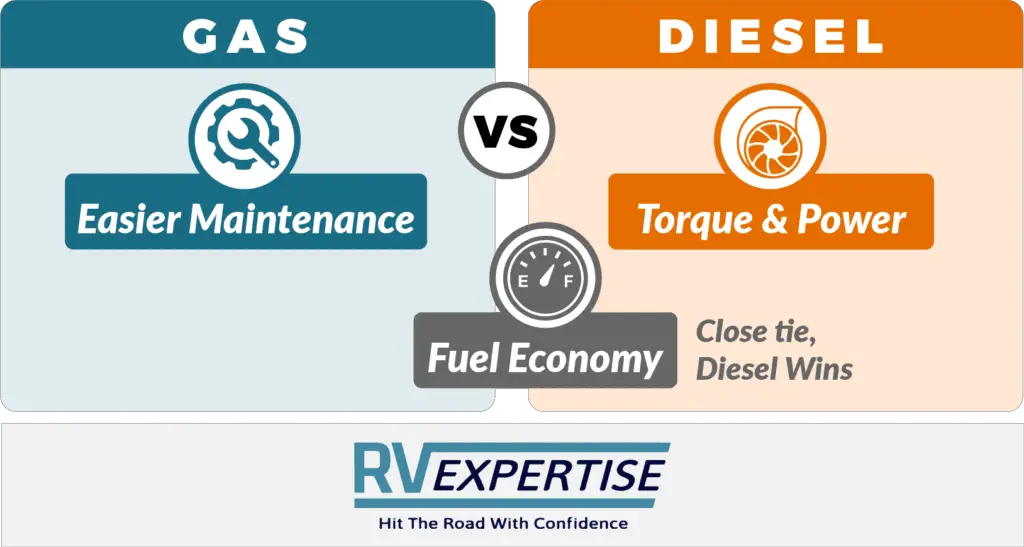
This question can also be viewed in terms of maintenance as well. And in this case, a gas engine easily wins as it is so much easier to look after a gas engine than a diesel engine. It’s also less costly.
In terms of fuel economy, the competition between the two types of engines is very close. Gas engines are catching up fast, but diesel still has a slight upper hand.
All in all, when it comes to 5th wheel towing capacity, you should think whether you need the power of a diesel engine. If you don’t, a gas engine will be better.
Do Wet Roads Affect 5th Wheel Towing Capacity?
Everyone wants to avoid wet roads, and for good reason. Not only is driving on wet roads very difficult, but it can also cause some of the worst accidents. And to make it worse, the difficulty of driving on wet roads is increased tenfold when you have a trailer in tow.
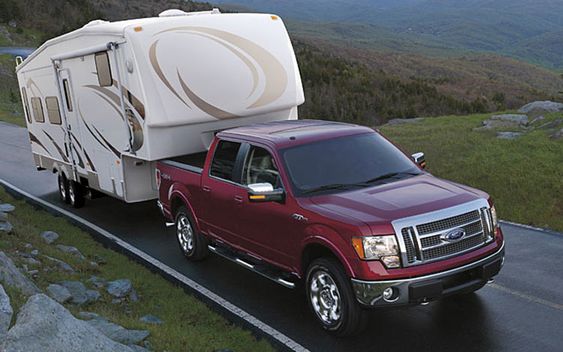
Of course, wet roads take a toll on your 5th wheel towing capacity as well. As there’s less friction between the road and the tires, controlling the vehicle will be much more challenging. The added weight isn’t much of much help either, so it’s better to tow less whenever you drive on wet roads because safety always comes first!
How to Choose The Best Hitch For Towing a 5th Wheel
Referring to the chart below, there are three types of hitches. The first is a fixed hitch, which is available and feasible for long beds (8 feet). This type of hitch doesn’t need to be adjusted after it has been installed. Especially when we talk about long-beds, they allow enough space between the trailer and the cab that even when the vehicle makes a sharp turn, the two parts will not come into contact with each other. They’re also more cost-effective, so they’re a popular option.
There’s also a type of hitch that has two arms and is called the sliding hitch. These are popular for beds between 6 and 8 feet in length. Because a fixed hitch can’t give turning clearance, it isn’t ideal for beds shorter than 8 feet. A sliding hitch, on the other hand, solves this issue easily.
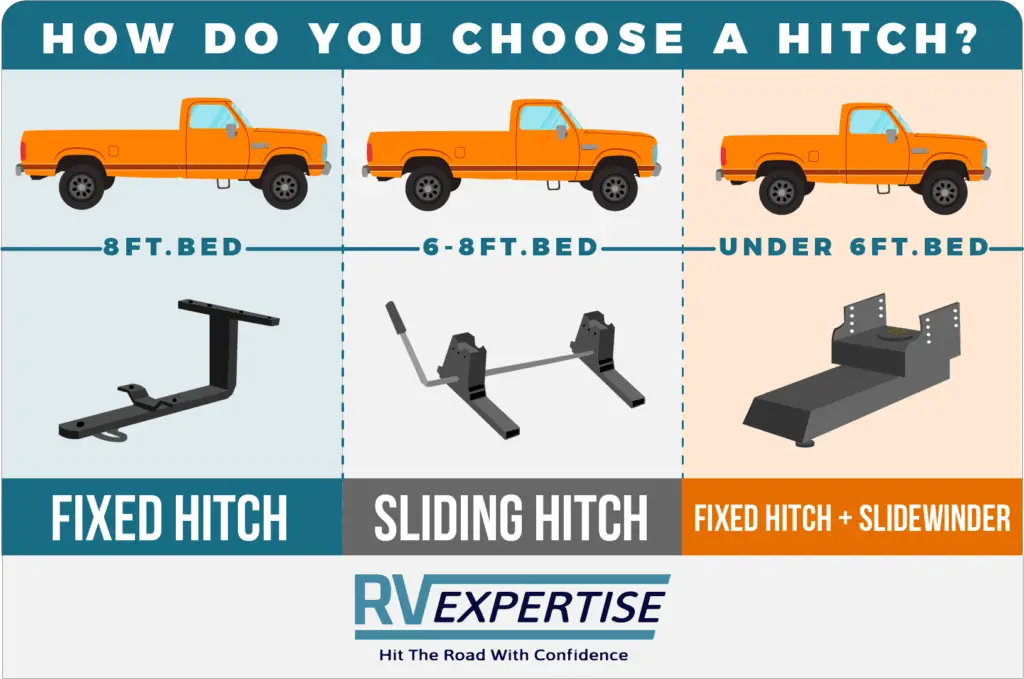
The sliding hitch provides the clearance needed by sliding towards the tailgate of the truck whenever a sharp turn is made. This creates the distance required to make the turn comfortably. There are two types of sliding hitches, manual and automatic. While a manual sliding hitch needs to be adjusted from locked to turn every time you need to make a sharp turn, an automatic sliding hitch is self-adjusting.
Last but not least is the sidewinder. With this kind of hitch, the pivot point is situated 22 inches behind the kingpin, providing enough space to make turns with ease. It’s recommended that the sidewinder should be used with the fixed hitch, as there has to be something that prevents the kingpin from rotating in the hitch.
Which Truck Class is Best for Towing a 5th Wheel?
The simplest answer is that the class of your truck depends on the size of your trailer. As seen in the 5th wheel towing capacity chart below, it has been divided into three different sections.
The first section shows a trailer that’s less than 30 feet and weighs approximately 10,000 pounds when fully loaded. For this trailer, a ½ ton truck would be sufficient as it can easily fulfill your towing needs.
The second trailer is approximately 39 feet and weighs up to 16,000 pounds when it’s completely loaded. For this trailer, the best bet would be a ¾ ton truck as it would have more 5th wheel towing capacity and be able to pull that kind of weight without much of a struggle. Last but certainly not least is a trailer that’s 40 feet or above, and as you might expect the weight it can carry is also more and exceeds 16,000 pounds.
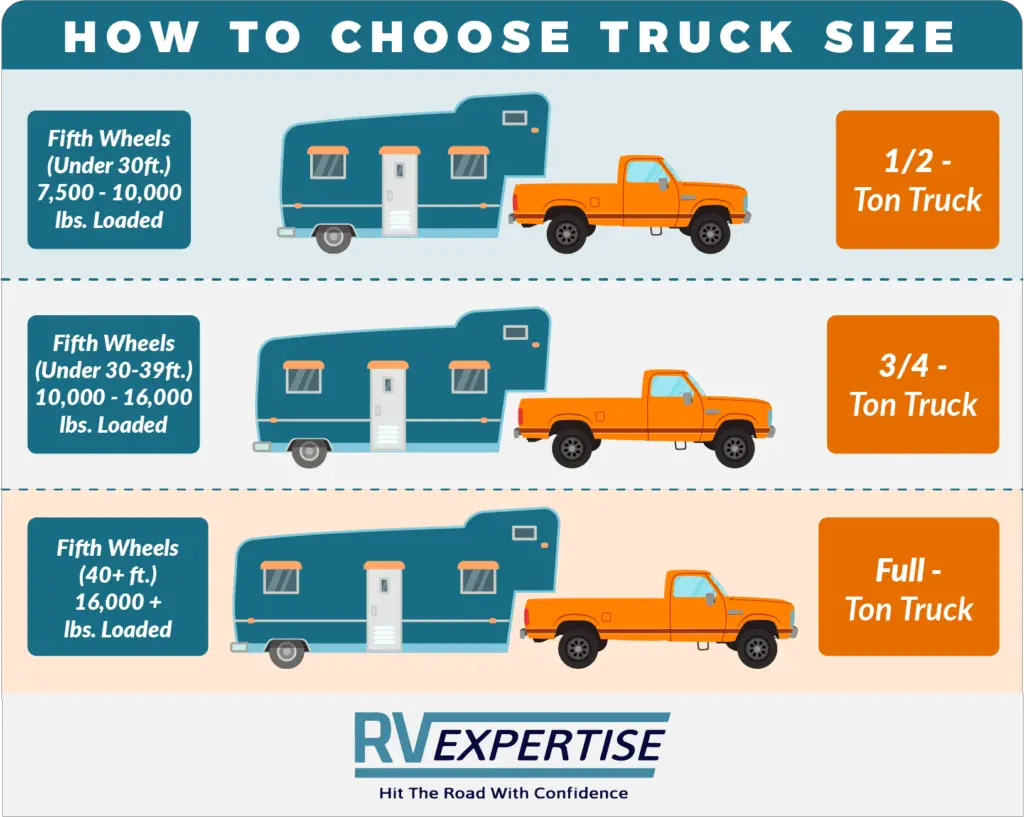
Since this is quite heavy, it also requires a heavy-duty truck to move. For this you’d need a full ton truck, which can pull an amazing amount of weight without facing any complications. So, if you want to find out which truck class is the best for you, just consider the height and weight of the trailer and everything else will work itself out!
Simple Math That Answers: “What’s The Maximum I Can Tow?”
This is another question with a simpler answer. As the 5th wheel towing capacity chart below indicates, you need to be wary of three things when it comes to calculating the maximum weight that you can tow. First, figure out the gross vehicle weight: this is the weight of the truck itself, all the passengers and the cargo in the truck.
This then needs to be added to the weight of the trailer. Be sure to add the weight of the loaded trailer, otherwise the calculation will be futile. Once you add these two figures up, you’ll have the maximum amount of weight you can tow, which is also known as the gross combined weight.

Good Sam Guide to Towing (FREE GUIDE)
The Good Sam Guide to Towing is a free guide that covers everything you need to know and will provide answers to your unanswered questions. The contents of the guide are separated into various categories. The first one talks all about towing vehicles and technology.
In this section, all the newest trucks, SUVs, and the latest technologies in the towing world have been discussed. In the second section, the guide gives a handy explanation of how it should be used. This makes it quite easier for the reader, as they can attain a full understanding of what they are about to read.
For the third section, the guide talks about the tow ratings. This section primarily looks at tow ratings given out by manufacturers and consolidates them.
In the fourth section, the guide highlights a very important topic, which is towing fundamentals. It offers tips and tricks that help in maneuvering trailers and towing vehicles as well as other essential details.
Lastly, the guide offers some hitching basics. It teaches the user how to choose the best hardware for their vehicle. It enables the reader to make the perfect hitching match.
5th Wheel Towing Capacity
We all know that towing isn’t all fun and games, and there’s a certain amount of caution, care, and calculation that goes into the entire process.
But now that know more about 5th wheel towing capacity, you can make a better decision about which vehicle is right for you. Towing capacity is an important consideration when choosing a vehicle for towing a 5th wheel.
Be sure to re-check the 5th Wheel Towing Capacity chart above to see how much your vehicle can tow. And remember to always consider the type of 5th wheel you will tow, as well as the weight of the 5th wheel.
With this information, and whichever size truck, engine type, you can choose a vehicle, or a 5th wheel hitch that will safely and effectively tow your 5th wheel. Safe travels!

Hello, fellow wanderers! I’m Alyssia. Since 2008, my husband and I have called an RV our home, journeying through life one mile at a time. Our nomadic lifestyle has led us to over 70 countries, each with their unique tales that have shaped our own.
I share our stories and insights right here, hoping to inspire and guide you in your own adventures. Expect tips on RV living, our favorite camping spots, breathtaking hiking trails, and the joys and challenges of an ever-changing view from our window. Alongside, you’ll also find practical advice on outdoorsy stuff, designed to equip you for any journey. Join us as we continue to explore the vast, beautiful world on wheels!